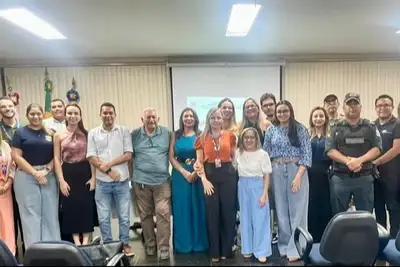Jabuti Award winner, writer Socorro Acioli participates in the last day of the Book Fair, this Friday, 22
The author meets professor Janete Borges for a chat about ancestry
The Cearense Socorro Acioli, one of the greatest names in contemporary Brazilian literature, is present on the last day of the 28th Pan-Amazonian Book Fair and Multivoices. Author of more than 20 books, she writes for all audiences and won the Jabuti award in the children's category in 2013.
Acioli is also a journalist and professor, with a Master's in Brazilian Literature and a Doctorate in Literary Studies. She has achieved international success and had her works published in several countries such as the United States, England, France, Mexico, and Italy.
Invited for the day of the Voices of Ancestry, the writer addresses the theme deeply and sensitively in her texts. Just take a few steps through the book fair to find two of her greatest successes, 'Cabeça do Santo' and 'Oração para Desaparecer', which have ancestry and Brazilian identity as their essence. The author comments on this and on her first visit to Belém.
1. What are your expectations for visiting the Pan-Amazonian Book Fair and for your trip to Belém?
It is a very talked-about fair, my other writer friends always spoke highly of it, and I really wanted to go. And it’s my first time also getting to know Belém. I have high expectations to find this very particular universe that exists in Belém, that Pará has, and to learn about the local production, the local literature. And to be in a place that was my dream.
2. You were invited to participate in the Book Fair on the day of the Voices of Ancestry, how does this theme relate to your work?
This theme of the voices of ancestry I think actually guides my work. Especially the two novels, 'A Cabeça do Santo' and 'Oração para Desaparecer', they are built on testimonies and historical accounts. Voices that would be forgotten if they were not recorded there.
One of the prides I have with this book [Oração para Desaparecer] is being able to give voice to people who had very important stories to tell, to the indigenous peoples of Ceará, about our past, and I was able to include that in the book.
3. In one of your greatest successes, 'Oração para Desaparecer', ancestry is a central point. How did the idea for this story come about?
The story arises precisely from this narrative of ancestry. The idea came from a real photo of this church that was covered by sand, it was covered for 45 years, and from this photo, I began to investigate who the people in the photo were. Thus, I discovered an incredible story about what this church represented in our colonization process, beautiful on one side, very violent on the other, and the church is a symbol of that.
4. Some of your books address themes such as Brazilian identity and fantasy, do you believe these two themes connect in any way?
I even say that people call my books magical realism. I have been calling my books Brazilian delirium, because they are stories completely linked, connected to Brazil. The idea of our land, everything that has happened, that happens on this soil, and also the part of Brazil that is inexplicably magical. This magic and these beautiful absurdities that spread throughout Brazil.
5. Besides being a writer, you have also dedicated yourself to an academic career, journalism, and work as a teacher. When did the desire to invest more in writing arise?
My desire to write has been since I was little, I went into academia, into journalism, as ways to further improve my work as a writer. There were moments in my life when I still doubted that it was possible to live from writing. So, in academia, I did my master's and doctorate in literature to improve my understanding within my craft. Journalism gave me the main foundation for my work, learning what investigation and research are, which I always use in all my books. But the desire to write has been there since I was born. I even published a book when I was eight years old.
6. Another of your successes, 'A Cabeça do Santo', was developed from a workshop with the renowned author Gabriel García Márquez. Today you also teach writing courses, what is the importance of this type of training and exchange with other writers?
The course with Gabriel García Márquez completely changed my life. Because of this course, between 2009 and 2024, I taught writing courses, but I stopped to be able to write. I had to make a choice between one thing and the other. But these courses brought me many joys, many friends, and I am proud to say that many people have been published. Many former students have been published and are succeeding, and that makes me happy. The greatest reward I have is seeing the success of talented people who needed a push.
Socorro Acioli participates in the closing of the fair, in a chat with Janete Borges, at 7 PM in the Multivoices Arena. After the conversation, she will meet fans for a signing session at the Author's Point.
Text: Juliana Amaral/Ascom Secult













